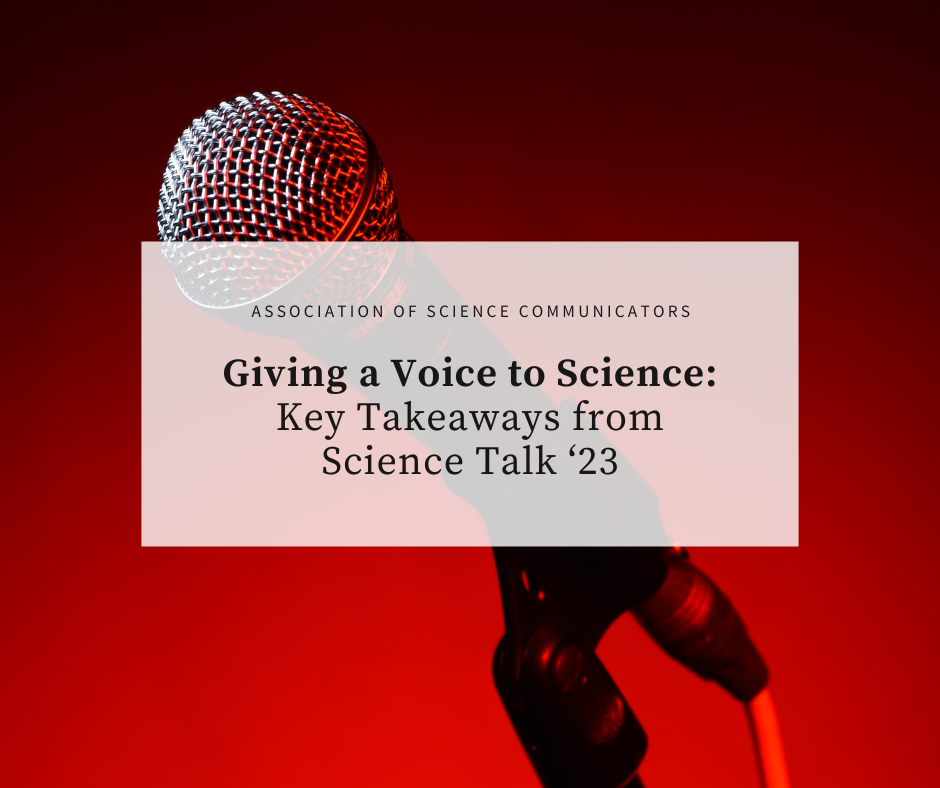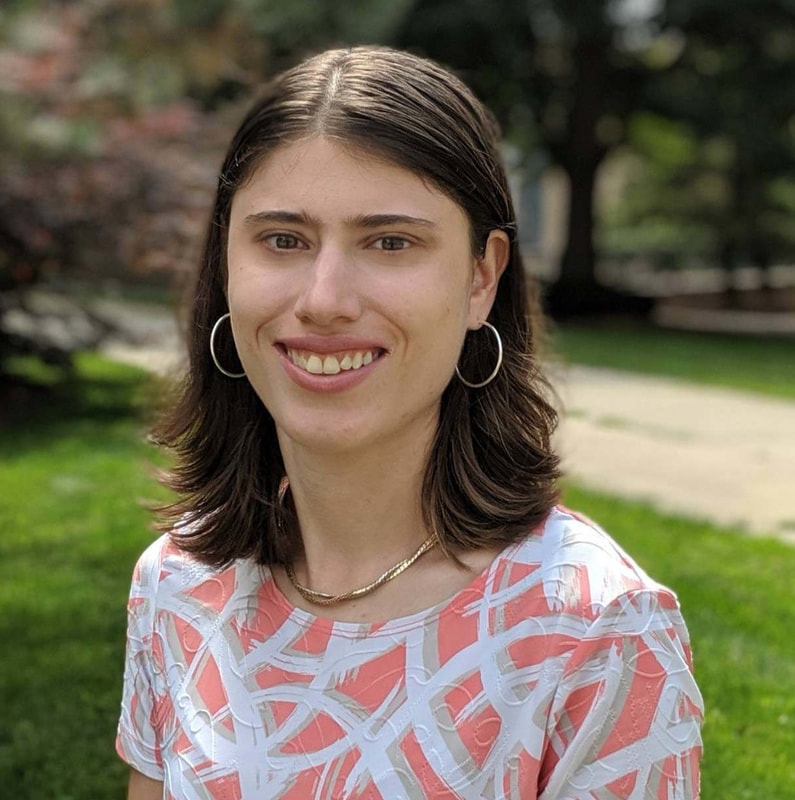
The Association of Science Communicators (ASC) hosted its 7th annual Science Talk Conference last month and the evolution of science communication was on full display.
This year’s theme centered around “Giving a Voice to Science” and participants saw that message echo through keynote presentations from leaders in the community, panel discussions pulling back the curtain on communications strategies behind internationally important scientific endeavors, and workshops targeted toward skill development for every level of science communicator.
ASC’s Dr. Allison Coffin and Dr. Kiki Sanford shared some of the best moments from the 2023 Science Talk Conference.
This is ASC’s first year hosting Science Talk after making the shift to an association. And this is the second year Science Talk has been held as a hybrid event. What changes did you notice in the audience and the event compared to previous years?
Kiki Sanford: We definitely saw an uptick in interest and energy around the in-person offering for the event. Our attendance was even higher than last year and the crowd seemed very excited to engage in the sessions and network with other attendees. We had several people who attended virtually last year decide to come in person this year, and even bring peers and colleagues with them to build the community and develop their skills together. It was all very invigorating! For the second year in a row we ran Science Talk as a hybrid event, and while we saw fewer virtual attendees this year compared to last, we don’t see the hybrid option going away. We will continue to iterate and improve the experience for virtual attendees in order to keep Science Talk as accessible as possible. This year some improvements included organizing panel discussions that cohesively included in-person and virtual panelists, and incorporating more multimedia elements and networking opportunities for remote attendees.
Looking at Science Talk this year compared to previous years through a content lens, we saw some big shifts in the programming that extended beyond the basics of science communication and dove deeper into skill development for every level of science communicator. There was a strong focus on professional development that is instantly applicable in every science communicator’s role. For example, how to create a successful communications plan, strategic thinking, applying science communication to specific research examples, and so on. It’s been amazing to witness that evolution and it really inspired some new ideas for next year’s conference.
Allison Coffin: This year’s Science Talk saw many new faces but also many returning ones, which I think reinforces our goal to make the conference, and ASC, the home of the science communication community. We saw session presentations from key science communication stakeholders, including NASA, Science Friday, Oregon Public Broadcasting and AAAS. We also saw sessions that bring important research findings to science communication, such as how to find more diverse, representative images for external content creation. I think the breadth and depth of sessions showcases Science Talk’s maturation as we better serve the science communication community.
Tell us more about this year’s theme: Giving a Voice to Science.
KS: The inspiration for this year’s theme was centered around how addressing different audiences with communication that resonates with their specific beliefs, values and cultural norms can actually bring different voices and new ideas to the world. We found that by sharing that broad theme with our presenters this year that they naturally wove in strong diversity themes, such as communicating science with Latin communities or communicating science with faith-based audiences. The way our selection process works, the community votes on proposals to decide what will be presented at Science Talk and it was evident based on the final agenda that the professional scicomm community wants more content on how to improve communication with diverse audiences.
What were some of your favorite moments from Science Talk 2023?
AC: There were some many incredible presentations this year, but one that really stood out was the NASA Webb Telescope media team panel. They shared behind-the-scenes of the 14-year media campaign around NASA’s largest and most challenging space mission. An in-depth look into such a well-known campaign and hearing their learnings, challenges and successes was truly invaluable. I also think the NASA panelists enjoyed presenting at Science Talk. Many people around the world have seen the end products of their work, but the conference is home to their peers–the people who understand and appreciate the nuance of this multinational project.
Another really interesting panel was led by a team of epidemiologists that took on major challenges during the pandemic beyond “how do you communicate with people who don’t trust you” and into “how do you work with the FBI when you and your family are getting death threats”. It shed a new light on putting yourself at the forefront of a controversial topic and considerations science communicators need to keep in mind to protect themselves from the backlash.
KS: I was also really impressed with the creativity and persistence in the keynote presentations. Nalini Nadkarni, professor & ecologist at the University of Utah, shared how she pairs her scientific background with her passions to explore creative paths to communicate with people in other cultural communities. She started going to different denominational churches, met people, talked to them, found out what is important to them, and after better understanding their values and communication style, opened up avenues to discuss conservation. She’s explored similar avenues with prisons, fashion design and art, and corporations to share her conservation message in a meaningful way. After sharing her story, she discussed how you seek out that new direction to go in and persist to make it happen.
Another of our keynote speakers, Tamara Krisnky, co-host and writer for Tomorrow’s World Today, shared a similar perspective drawing from her work interviewing celebrities on red carpets and how that experience taught her to lean into the moment and the uncertainty, be aware of what’s happening outside the bubble of the conversation, and how to be ready & willing to improvise to keep things moving. It echoed similar themes of having a strong awareness of the world and what’s going on around you to better communicate science.
You recently published an open letter calling on science communicators to recognize their role in democratizing and increasing access to science. How did that tie in to Science Talk’s “Giving a Voice to Science” theme and how has it resonated with the scicomm community?
AC: We shared the open letter at Science Talk and immediately saw a surge in signatures. It was exciting to see that kind of energy around the initiative. Many of the conversations we hear around open science is that it is a huge effort right now and something people recognize as important, but there is not enough emphasis on where communications will play a role. If we want to recognize science as a basic human right, then we as a society need to communicate that science – authentically, honestly, and with recognition of diverse ways of knowing. Science communication still lacks the funding infrastructure and basic path to let people know science is a part of their everyday lives.
Our goal with the open letter, which is still collecting signatures, is to get more people in the community to recognize themselves as science communicators and the role they can play in democratizing science for those who look to them for information and guidance. Whether you are a professor at a university, journalist, local TV meteorologist, trusted mechanic, chocolatier, sustainability social media influencer, the list goes on–you are a science communicator. If you are a science communicator, sign the open letter here and join the mission.
One of the reasons ASC made the change to become an official association was to provide year round professional development events for its community. What are some of the upcoming courses and events members (and aspiring members) should keep on their radar?
KS: We have a lot on the docket and are constantly updating our members with new professional development opportunities. Courses are ongoing throughout the year and we are working to improve our online course platform and secure additional course instructors for the coming months.
We are also planning quarterly virtual talks and mixers to keep the community connected and offer additional networking opportunities. Our goal over time is to establish regional ASC chapters so we can host local events in-person. We are always looking for people interested in hosting these events, or becoming chapter leaders, as we continue to shape that goal.
The best way to stay up to date is to join ASC. Your membership opens access to year-round professional development and networking opportunities and shows your support for our mission to Give Science a Voice.



Leave a Reply